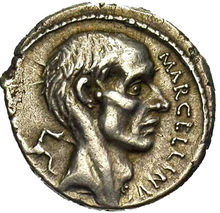Marcus Claudius Marcellus | |
|---|---|
 Coin depicting Marcellus, 55 BC | |
| Born | c. 270 BC |
| Died | 208 BC |
| Cause of death | Killed in action (impaled by a spear) |
| Nationality | Roman |
| Occupation(s) | General and politician |
| Office | Aedile (226 BC) Consul (222, 215, 214, 210, 208 BC) |
| Children | Marcellus |
| Military career | |
| Allegiance | Roman Republic |
| Battles / wars | First Punic War, Gallic War of (225 BC), Battle of Clastidium, Second Punic War, Siege of Syracuse, Battle of Numistro |
| Awards | Spolia opima |
Marcus Claudius Marcellus (/mɑːrˈsɛləs/; c. 270 – 208 BC) was a Roman general and politician during the 3rd century BC. Five times elected as consul of the Roman Republic (222, 215, 214, 210, and 208 BC). Marcellus gained the most prestigious award a Roman general could earn, the spolia opima, for killing the Gallic king Viridomarus in single combat in 222 BC at the Battle of Clastidium. Furthermore, he is noted for having conquered the fortified city of Syracuse in a protracted siege during which Archimedes, the famous mathematician, scientist, and inventor, was killed, despite Marcellus ordering the soldiers under his command not to harm him. Marcus Claudius Marcellus died in battle in 208 BC, leaving behind a legacy of military conquests and a reinvigorated Roman legend of the spolia opima.